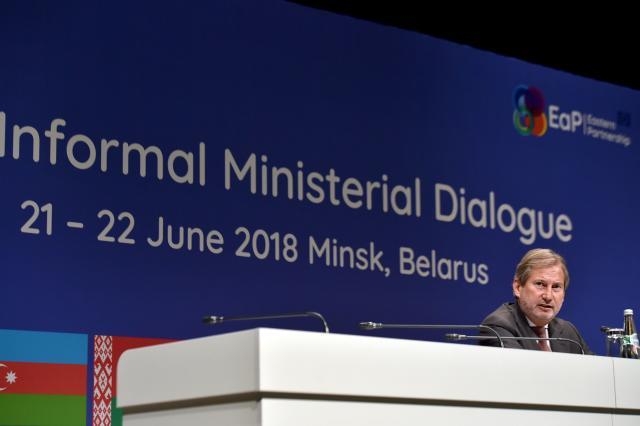
The EU and the six Eastern Partner countries have agreed to step up their cooperation on the digital economy, adopting a road map on reducing roaming charges, addressing the cybersecurity threat in a coordinated manner, and expanding e-services to create more jobs in the digital industry.
Speaking in Minsk, Belarus, where he was taking part in the 10th Eastern Partnership Informal Partnership Dialogue on 21-22 June, European Commissioner for Neighbourhood Policy Johannes Hahn said: "The EU will continue to work closely with its Eastern partners in the digital area, for the benefit of citizens across the region. Promoting high-speed broadband internet to boost economies and expand e-services, creating more jobs in the digital industry, reducing roaming tariffs among the Eastern partner countries and tackling cybercrime and cybersecurity is a priority. We are focused on delivering concrete results, with a clear programme for cooperation until 2020.”
Commissioner for Digital Economy and Society Mariya Gabriel said: "Today's Informal Partnership Dialogue proves that we are on the right path towards a common European digital future. We warmly welcome the commitment of our Eastern partners to achieving the Deliverables by 2020, and thereby helping to build a stronger digital economy bringing direct benefits to the citizens and to succeed the digital transformation. Enhanced broadband connectivity, roadmap for reducing roaming tariffs and cooperation on cybersecurity are just some of the few first steps in the long-term digital collaboration between the EU and its Eastern Partners."
The 10th Informal Partnership Dialogue in the framework of the Eastern Partnership bringing together the EU and the six Eastern Partners - Armenia, Azerbaijan, Belarus, Georgia, the Republic of Moldova and Ukraine – was being hosted by the Republic of Belarus.
The working sessions covered sectoral cooperation in the digital economy, and foreign affairs. On the former, three primary objectives were identified:
1. The need to adopt a road map on reducing roaming charges;
2. addressing the cybersecurity threat in a coordinated manner
3. Exploiting the potential that the digital economy and society brings to business stakeholders and citizens.
On the latter, Commissioner Hahn, Deputy Secretary General of the European External Action Service Jean-Christophe Belliard and Minsters of Foreign Affairs of the six Eastern partner countries expressed a clear vision for the future based on the 20 Deliverables for 2020 in four priority areas: 1. Stronger economy; 2.Stronger governance; 3. Stronger connectivity; 4. Stronger society. Concrete goals include extending the core TEN-T network to the partner countries, increasing energy efficiency, facilitating lending for SMEs in local currency, and supporting young people.
The informal Eastern Partnership dialogues are held once a year and hosted in turn by the Eastern Partnership countries. They create room for an open and informal exchange of views between the partner countries and the EU high level representatives on foreign policy and sectorial cooperation areas.




